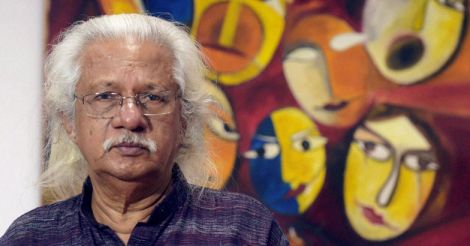Thiruvananthapuram: Think Malayalam cinema and the name Adoor Gopalakrishnan will invariably come to mind. In an industry driven by lowbrow entertainment and fast buck, Adoor was always a rebel.
From Swayamvaram (1972) to Pinneyum (2016), Adoor has made 12 films and, in the process, has made an indelible mark on India’s cinematic history. Made out of commercial framework, his films dealt with themes that were rarely confronted in mainstream cinema.
The depth and subtlety in his cinematic probing of human minds is a textbook in film studies as there is probably no other director who has expressed what’s going on in a character’s head or heart more accurately than Adoor, without being dependent on dialogues.
Before the function, Onmanorama caught up with Adoor for a quick chat. Excerpts from his interaction with us and later with the audience:
My teachers, thus me
I wouldn’t have become a filmmaker if I hadn't joined the Film Institute of India in Pune (1962). I owe my career to the great teachers of that institution. I see it as a blessing indeed. I was fortunate to be a student of celebrated Bengali filmmaker Ritwik Ghatak at Pune.
I’m also grateful to Satyajit Ray for Pather Panchali, which was pretty much like a textbook during our learning days. Our professor of film appreciation Satish Bahadur used to show us Pather Panchali with sound, without sound and without visual. We have analyzed each and every bit of that film.
Prof. Takhar taught us about song and aesthetics; Prof. Pruthi introduced screenplay writing to us. We used to write scripts every day. They were all very strict and affectionate.
Over the term 'festival movies'
I've been making films for the last 50 years now. I've been seeing the industry and the society all these years and I cannot claim that tastes of our audience has improved in any way. Although we are a very literate society and we see great participation in film festivals, our audiences' experience has not improved.
Last year, a number of good films were made across the country but none of it could pull crowd like we see here at the festival. We see an overwhelming response for such movies during festivals. But these people won't go to a theater to watch the same film when we release it commercially. It's been an enigma. The very idea of such film festivals are to educate people about world cinemas, so that they will go to theaters for watching such movies.
Of past, present
The technology has taken a giant leap in the last 10 years. I used to type my scripts on a typewriter. It was a habit I received from FTII. The teachers used to insist that we get our scripts typed and bound. Then came personal computers. It helped us a lot. In this digital age, no matter what your profession is, you need to learn new things. You can't be a professional if you are not tech-savy.
Pinneyum was the first movie I shot on digital format. One of my editor lost job as he could not adapt to it. At first, I had a lot of concerns about the changes. But when I started using it, I found it so easy. Technological advancement eases many complexities in film making. Now it's a wonderful experience to watch movies in theaters, which has 7.1 and 5.1 sound systems. With technology, democratization of cinema happened. Now anyone can take a movie. All you have to do is to tell a story.
About challenges
When you look at my 50-year career, you can see that most of the time, I was not making films. I made only 12 films in these 50 years. It wasn't an easy task. There were new challenges in terms of distribution, production and exhibition. The unchanged outlook of the audience is also a problem.
A brief note about IFFK
Over the years, the International Film Festival of Kerala has become a notable festival. So far, the festival is running good. We have a lot of good films and good events. I feel very happy and proud to see the growth of IFFK. It was started in Kozhikode 20 years back. Then, I was the chairman of the organization and every year, the venue changed. I did not feel that will help any good. Hence, during my term as chairman, I changed the festival venue to Thiruvananthapuram.
Now, everyone around the world can recognize IFFK as the film festival of Kerala. It will also help to identify our capital city in international level. During the last 20 years, the festival has been progressing rapidly. Now, most of the theaters have advanced facilities. The next step will be completing own festival complex. I hope the state government will make that dream come true in two years.
On critics
There are three people whose criticism I really care about. According to me, they understand cinema the best. They are my friends Satyajit Ray, Mrinal Sen and Shyam Benegal. They're the ones who understand my films the most. I always value their comments.

























 File photo of Adoor Gopalakrishnan
File photo of Adoor Gopalakrishnan